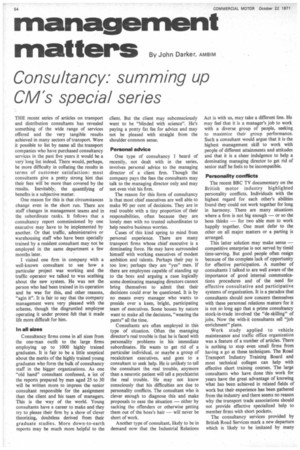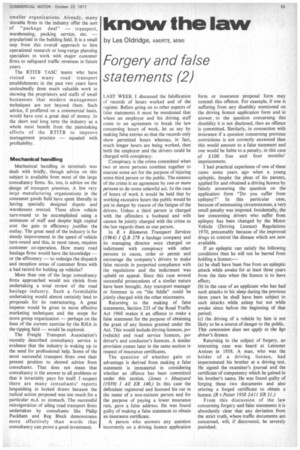management
Page 56

Page 57

If you've noticed an error in this article please click here to report it so we can fix it.
matters By John Darker AMBIM
Consultancy: summing up CM 's special series
THE recent series of articles on transport and distribution consultants has revealed something of the wide range of services offered and the very tangible results achieved in many sectors of transport. Were it possible to list by name all the transport companies who have purchased consultancy services in the past five years it would be a very long list indeed. There would, perhaps, be more difficulty in collating the results in terms of customer satisfaction: most consultants give a pretty strong hint that their fees will be more than covered by the results. Inevitably, the quantifying of benefits is a subjective matter.
One reason for this is that circumstances change even in the short run. There are staff changes in management teams and in the subordinate ranks. It follows that a consultancy report commissioned by one executive may have to be implemented by another. Or that traffic, administrative or warehousing staff who have been specially trained by a resident consultant may not be employed in the same department a few months later.
I visited one firm in company with a well-known consultant to see how a particular project was working and the traffic operator we talked to was scathing about the new system. He was not the person who had been trained in its operation and he was for this, and other reasons, "agin it". It is fair to say that the company management were very pleased with the scheme, though the disgruntled employee operating it under protest felt that it made life more difficult for him.
In all sizes Consultancy firms come in all sizes from the one-man outfit to the large firms employing up to 1000 highly trained graduates. It is fair to be a little sceptical about the merits of the highly trained young graduates who form the bulk of consultancy staff in the bigger organizations. As one "old hand" consultant confessed, a lot of the reports prepared by men aged 25 to 30 will be written more to impress the senior consultant responsible for the assignment than the client and his team of managers. This is the way of the world. Young consultants have a career to make and they try to please their firm by a show of clever theorizing, doubtless derived from their graduate studies. More down-to-earth reports may be much more helpful to the
client. But the client may subconsciously want to be -blinded with science". He's paying a pretty fat fee for advice and may not be pleased with straight from the shoulder common sense.
Personal advice One type of consultancy I heard of recently, not dealt with in the series, involves personal advice to the managing director of a client firm. Though the company pays the fees the consultants may talk to the managing director only and may not even visit his firm.
The reason for this form of consultancy is that most chief executives are well able to make 90 per cent of decisions. They are in real trouble with a tiny proportion of their responsibilities, often because they are lonely men with no trusted subordinates to help resolve business worries.
Cases of this kind spring to mind from personal experience. There are many transport firms whose chief executive is a dominating force. He may have surrounded himself with working executives of modest ambition and talents. Perhaps their pay is too low; perhaps they arc "yes" men. If there are employees capable of standing up to the boss and arguing a case logically some dominating managing directors cannot bring themselves to admit that their decisions could ever be questioned. It is by no means every manager who wants to preside over a keen, bright, participating team of executives. Some bosses by nature want to make all the decisions, "wearing the pants" all the time.
Consultants are often employed in this type of situation. Often the managing director's real trouble is that he is faced with personality problems in his immediate subordinates. He wants to get rid of a particular individual, or maybe a group of recalcitrant executives, and goes to a consultant to seek help. He is unlikely to tell the consultant the real trouble, anymore than a neurotic patient will tell a psychiatrist the real trouble. He may not know consciously that his difficulties are due to personality conflicts. The consultant who is clever enough to diagnose this and make proposals to ease the situation — either by sacking the offenders or otherwise getting them out of the boss's hair — will never be short of work.
Another type of consultant. likely to be in demand now that the Industrial Relations Act is with us, may take a different line. He may feel that it is a manager's job to work with a diverse group of people, seeking to maximize their group performance. Such a consultant would argue that it is the highest management skill to work with people of different attainments and attitudes and that it is a sheer indulgence to help a dominating managing director to get rid of senior staff he feels to be incompatible.
Personality conflicts The recent BBC TV documentary on the British motor industry highlighted personality conflicts. Individuals with the highest regard for each other's abilities found they could not work together for long in harmony. There are many situations where a firm is not big enough — or so the boss thinks — for two able men to work happily together. One must defer to the other on all major matters or a parting is arranged.
This latter solution may make sense — competitive enterprise is not served by timid time-serving. But good people often resign because of the complete lack of opportunity for effective participation. A number of consultants I talked to are well aware of the importance of good internal communications procedures and of the need for effective consultative and participative systems of organization. It is a paradox that consultants should now concern themselves with these personnel relations matters for it is not so long ago that a prime consultancy stock-in-trade involved the "de-skilling" of jobs. Now the with-it consultants sell "job enrichment" plans.
Work study applied to vehicle maintenance and traffic office organization was a feature of a number of articles. There is nothing to stop even small firms from having a go at these techniques. The Road Transport Industry Training Board and most technical colleges can help with effective short training courses. The large consultants who have done this work for years have the great advantage of knowing what has been achieved in related fields of work but their experience has been gathered from the industry and there seems no reason why the transport trade associations should not provide effective specialized help to member firms with short pockets.
The consultancy services provided by British Road Services mark a new departure which is likely to be imitated by many smaller organizations. Already, many sizeable firms in the industry offer the sort of "package deal" — transport, warehousing, packing service, etc. — populariied in the building field. It is a small step from this overall approach to hire operational research or long-range planning specialists to work with major customer firms to safeguard traffic revenues in future years.
The RTITB TASC teams who have visited so many road transport establishments in the past two years have undoubtedly done much valuable work in showing the proprietors and staffs of small businesses that modern management techniques are not beyond them. Such advice, if proffered on a commercial basis. would have cost a great deal of money. In the short and long term the industry as a whole must benefit from the painstaking efforts of the RTITB to improve management practice — equated with profitability.
Mechanical handling
Mechanical handling in terminals was dealt with briefly, though advice on this subject is available from most of the large consultancy firms. So, too, is advice on the design of transport premises. A few very large manufacturing organizations in the consumer goods field have spent liberally in having specially designed depots and warehouses erected. These allow vehicle turn-round to be accomplished using a minimum of staff and despite high capital cost the gain in efficiency justifies the outlay. The great need of the industry is for steady improvement in the speed of vehicle turn-round and this, in most cases, requires customer co-operation. How many road haulage firms would have the knowledge — or the effrontery — to redesign the dispatch and reception areas of customer firms with a bad record for holding up vehicles?
More than one of the large consultancy firms approached would not shrink from undertaking a total review of the road haulage industry. Such a formidable undertaking would almost certainly lead to proposals for its restructuring. A great impetus would be given to more effective marketing techniques and the scope for more group organization — perhaps on the lines of the current exercise by the RHA in the tipping field — would be explored.
The Freight Transport Association's recently described consultancy service is evidence that the industry is waking up to the need for professional help. Some of the most successful transport firms owe their present position to shrewd advice from consultants. That does not mean that consultancy is the answer to all problems or that it invariably pays for itself. I suspect there are many consultants' reports languishing in locked draws because the radical action proposed was too much for a particular m.d. to stomach. The successful reinvigoration of ailing road transport firms undertaken by consultants like Philip Packham and Reg Block demonstrates more effectively than words that consultancy can prove a good investment.








































































































